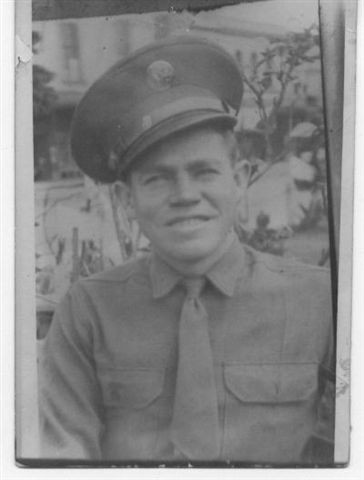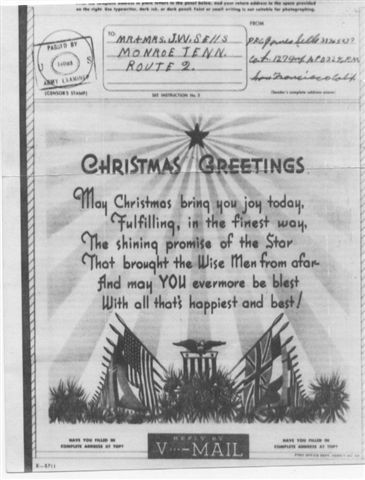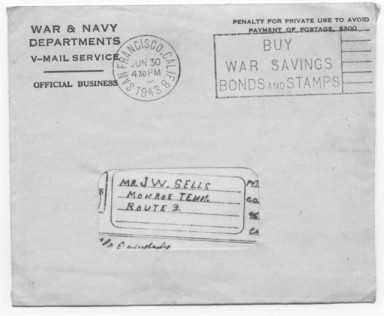|
Milbern Sells' World War II Letters
|
| Handwritten letters delivered by
the U.S. Postal Service are slowly being replaced by a quicker way to
communicate through computer generated email. If someone doesnít have a
email address today, that person is considered really out of step with the
modern world. Iíve even heard the term "dinosaur" used to describe anyone
that isnít involved with the use of computers today. Be that as it may, I
personally think that email will never really replace the personal contact a
handwritten letter has. Recently, I had the opportunity to browse through a
collection of letters that had been mailed during World War II. Just looking
through these letters was like holding the past in my hands while reading
about it in vivid detail. Milbern Sells, who just recently celebrated his 84th
birthday, served in the United States Army during World War II. As a single
young man, he was drafted into service, and served for three years. Milbern,
one of four sons, was the second one born to James W. Sells and wife, Stella
(Dennis) Sells. The Sellsí home was in the Mohawk Valley near Taylors
Crossroads. During the time he was in service, Milbern wrote home as often
as he could. Family members, neighbors and friends were good to write to
Milbern while he was away as well. He happened to have a mother who was a
keeper-type person, and by that I mean, she saved everything. Each of the
letters he wrote home was carefully put away, including the citation he got
when he was awarded the bronze star medal. Milbern had never laid eyes on
the citation until about a year ago. It, along with all his letters his
mother had saved, was given to him by a family member. The citation for the
bronze star medal reads as follows: "Sergeant (then
Private First Class) James M. Sells, Infantry, United States Army, for
heroic achievement in connection with military operations against the enemy
near the Villa Verde Trail, Luzon, Philippine Islands, on 1 May 1945. During
an attack by our forces on heavily defended enemy positions, Sergeant Sells
was one of the first men to reach the top of the hill. Although he was under
fire from a number of enemy light machine guns, he completely disregarded
his own safety and occupied a small enemy fox hole on the forward slope of
the hill in order to cover the further advance of the rest of the platoon.
His position was fully exposed to enemy view. He unflinchingly ignored the
hail of machine gun and sniper bullets that were constantly ripping up the
ground within inches of his body, and maintained a steady fire on the enemy
positions to his front, thereby enabling his platoon to move into position.
Although it appeared to be almost certain death to remain where he was, he
did not withdraw to a safe position until the entire hill was under our
control. Sergeant Sellsí unflinching courage, determination and devotion to
duty under fire are in keeping with the highest traditions of the United
States Army." The citation is signed by Brigadier General of the
U.S. Army, Robert B. McBride, Jr. One bit of information the citation does
not include is the fact that the back pack Milbern was carrying was shot off
his back as he made his way to the enemy fox hole. Other distinguished
medals awarded Milbern included the Purple Heart and the Good Conduct Medal.
|

Milbern
Sells while serving in the United States Army during World War II.
|
Most of Milbernís letters begin with making
inquiry about how everyone is at home. He usually included a paragraph or
two about what was going on with his unit. In one letter he described how
they washed their clothes in the creek, and he goes on to say that after all
the tasks he learned how to do since becoming a soldier, he would probably
make somebody a "good wife" when he got home. In another letter, he tells
his parents what he thinks is the reason his brother Truman isnít doing any
good fishing ... he isnít holding his mouth right. He inquires about the
construction of Dale Hollow dam, and wonders about the homes in Willow Grove
too. Other letters indicate that he is anxious to get back home to help with
the many chores involved in work on their farm.
Several letters Milbern wrote were sent through something
the War and Navy Departments used called V-Mail Service. V-Mail was a
service provided to soldiers whereby their letters were machine copied and
reduced by way of microfilm equipment, and then placed in an official V-Mail
envelope that was much smaller than even the smallest envelope we use today. |
| These letters could be
mailed postage-free by members of the armed forces. There are many V-Mail
letters contained in this collection. There were also some letters that were
written on Red Cross stationery during periods of time when Milbern had to
be hospitalized while in service. There was a time while Milbern served in
the military that several weeks passed, and no letter came to his family.
His parents became concerned, fearing that he could possibly be missing in
action. They contacted the War Department to inquire about their sonís
whereabouts. Milbernís explanation as to why his letters had not reached his
parents is that he was so far back in the jungles of Luzon, in the
Philippine Islands, it was hard to get those he had written carried out. The
soldiers depended on the natives to take their letters out to places where
they could be mailed, and many times, those letters didnít make it. He also
said that keeping writing paper dry was next to impossible because of the
constant rainy weather. The War Department did respond to Milbernís parents
inquiry, and wrote to advise them that Milbern was okay. That letter is also
among those his mother saved. The mail man, Fate Norrod, brought the good
news to Mr. and Mrs. Sells telling that Milbern was not missing after all.
Mr. Norrod knew how worried they were, and was happy to let them know their
son was alive and well.
|
|
Milbern was a member of the 32nd Infantry
Division and served in Australia, New Guinea, and the Philippines. He never
got a furlough during his time in service. There was one period he had the
same clothes on for 62 straight days while on the front lines in Luzon,
Phillippines. While being in the service was often hard, he told me that
never a day passed that they didnít have a little fun. He said there was a
"world of comedians"among the fellows serving while he was. He also had the
opportunity to see General MacArthur on one occasion, and Mrs. Eleanor
Roosevelt once visited his unit while he was in Australia.
After his time in service, Milbern married Marie Carter in
November of 1946. Their children are James, Janice, June and Jeanetta. Their
family now includes six grandchildren, nine great-grandchildren, and three
step great-grandchildren. Milbern and Marie have lived in the Allons
community for the last 21 years. Milbern still raises a garden thatís always
weed-free and neat as a pin. In fact, his garden looks as if he has it
trained to just take care of itself. The yard, as well as their home atop
Coffee Mountain, reflect what good care both get from Marie and Milbern.
|

A V-mail
Christmas card Milbern mailed to his family back home. |
|

A V-mail
letter that was mailed for free to servicemen during World War II.
|
The letters written during Milbernís time in
service are filled with details about daily activities of military life, and
include information about those he was writing to as well. Each is
considered a priceless treasure by his children, and through those letters,
the person that later became their father is shown to them in an entirely
different light. I canít imagine any email sent today beginning to compare
with that collection of letters. Some of the letters had been carried out of
a deep, dark jungle by a native to be mailed, and later, hand delivered on
the other side of the world by a kind and caring mailman to awaiting family
members anxious to receive word from their loved one. |
| Through each letter, Milbern
unknowingly preserved a bit of history, making it possible many years later
to catch just a glimpse into the life of a young serviceman who faithfully
wrote to family and friends back home. Email might reach its destination
instantaneously, but it still canít compare to that personal touch only a
hand-written letter can bring. |
|
Back |


